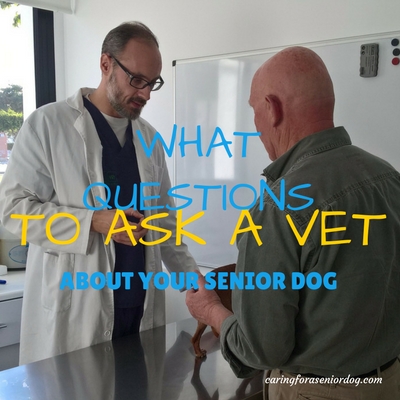
To get the most out of your appointment time, it’s a good idea to plan what questions to ask a vet about your senior dog.
I am a question asker. It’s who I am, and always will be. It’s hard for me to walk away from a situation without having all the info, and if I don’t I’ll go back until I get it.
Prep work
As I think of a question I write it down, so when it’s time for our appointment I’m ready. I include the concerns that brought me to this appointment, observations, changes in behaviour and anything else I feel is relevant and  helpful. I find this exercise particularly helpful when dealing with a senior dog who may be experiencing some health issues. Visits become more complicated, sometimes stressful, and it can be difficult to remember everything off hand.
helpful. I find this exercise particularly helpful when dealing with a senior dog who may be experiencing some health issues. Visits become more complicated, sometimes stressful, and it can be difficult to remember everything off hand.
Questions to ask
Since I’m an experienced question asker, not to mention a frequent visitor to the vet, who better to compile this list!!
They are in no particular order, and not all will be relevant to your situation.
How is my dog’s weight?
Maintaining an “ideal” weight is important for overall health, with obesity leading to many health problems, and weight gain and loss the possible result of illness. You vet will help you determine what is ideal for your dog.
Red is weighed before each appointment (as is every other animal that walks into that practice), and her weight plotted on a graph. It creates an easy visual where weight loss and gain are tracked, making it an important tool in the diagnostic “kit.”
Read this ⇒ The Truth About Weight Loss in Older Dogs
Should blood work be done?
Your vet may recommend yearly or twice yearly blood tests to see what’s going on, or more frequently if, for example, he’s monitoring a specific condition.
At what age is my dog considered “senior”?
Not every dog is considered “senior” at the same age, as it varies based on size/breed.
Is a urine sample needed?
I have lost count of the number of urine samples Red has provided. If there are changes in how often your dog drinks and/or pees, or other behaviour changes your vet is concerned about, a urine sample is often asked for as a starting point. Many analyses can be done right in the office, while others may have to be sent to a lab.
What do you think of our exercise routine?
Not all seniors slow down when the date on the calendar changes. Whether or not they should be toning it down a little, or making some changes to the types of exercises they do is a discussion to be had with your vet. Perhaps a 2 hour hike is becoming too much for your dog’s joints, and a shorter, less intense workout is better. Your vet may suggest adding swimming as a great way to keep in shape, burn off energy with no impact.
Read this ⇒ Keep Your Older Dog Active: Physically and Mentally
How is my dog’s diet?
Diet is such an important factor in the overall health of our pets, but it can be challenging trying to figure out the best food. Many vets will recommend a senior formulation once a dog officially becomes a senior, while others  don’t feel that change is necessary. What about the proponents of a prescription diet, raw diet, or home cooked whole foods?
don’t feel that change is necessary. What about the proponents of a prescription diet, raw diet, or home cooked whole foods?
Not every vet knows as much about nutrition as you think, many recommending the foods they stock from well-known pet food manufacturers. That is no guarantee the quality is there.
There is no shortage of information online so do your research, but don’t believe everything you read, you need to consider the source – of course that can be said about anything! Speak to your vet about the food he recommends and why. If you’re curious about a more natural approach, having a conversation with a holistic vet about their take on senior dog nutrition can be eye opening as well.
Does my dog need supplements?
The answer to that will depend on your vet. Some will tell you your dog’s diet has everything he needs, others may recommend one of the packaged foods that claim to contain added supplements, while others like the idea of incorporating some to round out the diet.
The types of supplements recommended will vary depending on your vet’s beliefs, experience and the issues your dog is dealing with. You may want to conduct your own research, then speak to your vet about your findings.
For example, if your dog is suffering pain from arthritis, he may already be on medication, but you’ve heard great things about glucosamine or New Zealand green lipped mussels and want to give them a try. See what he says and if you aren’t satisfied with his answer, ask more questions or consult with a holistic vet.
Read this ⇒ Supplements For Dogs: A Whole Foods Approach
What health risks are common in senior dogs?
Just because senior dogs are more likely to develop certain illnesses, does in no way mean they will, so don’t worry for nothing. You know the expression “forewarned is forearmed?” Knowing the possibilities means taking action to reduce the chances of something happening, or being aware of the signs so quick action can be taken. Early detection means better chances of successful treatment.
What vaccinations does my dog need, and how often?
Yearly vaccinations are critical to the health and wellness of pets.
We’re over-vaccinating our pets, and vaccines are responsible for the development of many diseases.
Depending on your vet you will get one of these opinions. As with the long running debate about the helpfulness or harm of vaccinating children, that debate has spilled over into what’s best for our pets.
As we’re talking about senior dogs here, are they still really necessary? I’m not suggesting for a moment we withdraw any kind of treatment that can help, but with possible weakened immune systems and extra pressure on their organs to process chemicals, can they hurt more than they help?
Ask your vet to explain what shots he’s recommending and why. If you have concerns you have the right to say no. Before your appointment do some reading about this topic, so you’ll be better prepared with questions during your visit. If you’re unsure about the need to vaccinate, make an appointment with a holistic vet to get his/her views on this and other issues about senior dog care.
How often does my dog need to see you?
Yearly checkups are recommended for all pets, twice yearly for seniors. If your vet is monitoring a specific condition, more frequent visits will likely be needed.
Is there a difference between a senior dog health check and adult dog?
It would be interesting to know if it’s only the frequency of visits that differ between the ages, or if your vet performs other tests or checks that are senior dog specific.
How are his teeth?
The whole month of February is dedicated to promoting pet dental health, and the message is getting through…but more work still needs to be done. Just as we do our best to take care of our teeth, the same must be true for our dogs. Poor oral hygiene not only leads to very bad breath and pain, it can cause organ damage and contribute to a variety of illnesses. Regular  brushing, water additives, chew toys/bones and regular checkups are the answer.
brushing, water additives, chew toys/bones and regular checkups are the answer.
Nothing wrong with starting today, but your dog will still need a checkup to determine your starting point. If his teeth are fine that’s wonderful news, but if there is tartar and/or inflammation it will need to be taken care of right away. Whether it will require dental surgery will be your vet’s call based on what he finds.
Read this ⇒ Senior Dog Dental Care: It Could Save Your Dog’s Life
Is it normal for my dog to be slowing down?
Plenty of seniors are more active than dogs half their age, while others begin to slow down. They may sleep more, not be as interested in walks, and don’t spend much time playing. It is normal, but it’s also important that any behaviour changes be brought to the attention of your vet. What many people mistake for natural signs of aging are really signs of trouble.
Could you check his ears please?
Ear infections are not uncommon, and left untreated can cause hearing damage or even loss. Catch a small issue before it becomes a big problem.
 Does my dog have tumours?
Does my dog have tumours?
Lumps and bumps are quite common in old dogs, and most are nothing more than fatty tumours that can stay where they are. Having said that, some may not be quite so benign so be sure to have your vet check your dog’s entire body. Ask your vet to show you how, so you can do it between visits.
Read this ⇒ Lumps and Bumps in Older Dogs
Does my dog have arthritis?
Your observations can go a long way to helping your vet answer that question. Have you observed changes in the way he walks? Does he seem less interested in taking walks? Any trouble lying down or getting up? Stiffness? Answering yes, even at the slightest hint, may indicate some degree of joint pain.
Read this ⇒ Arthritis and Dogs
Is it a good idea to bring a new pet into the family?
Many people assume their old dog would love a playmate, especially a young one to help him discover his inner puppy again. That’s your opinion, not your dogs!! Sometimes older dogs are more sensitive to noise than they  used to be, they get more easily annoyed and are happy hanging out on the couch with you, or in their bed. They may not have the energy, or feel up to someone bothering them all the time.
used to be, they get more easily annoyed and are happy hanging out on the couch with you, or in their bed. They may not have the energy, or feel up to someone bothering them all the time.
You should know your dog well enough to have an idea how he feels about other pets. Does he like to play but has no one to play with? Would he be satisfied with a low energy older dog to snuggle up with?
It’s possible it could work, but you have to think long and hard about what your dog can, and cannot handle.
Read this ⇒ Introducing a New Dog to an Old Dog
What is else can I do to improve my dog’s quality of life?
Even if you’ve asked your vet everything under the sun, I often ask this general “what else can I do” question. I can’t say why, I guess I’m looking for that magic answer that will keep my dog healthy and with me longer.
Is my dog too old for anesthesia?
A fair question since anesthesia is always a risk, no matter the age of the patient. It has become safer than ever before, and in many cases the benefits of going ahead with surgery far outweigh the risks associated with doing nothing.
Pre-4op blood work is always recommended, particularly with senior dogs. It helps identify underlying conditions that may cause a problem, and enables the vet to tailor the anesthesia to the needs of your dog.
Read this ⇒ Anesthesia and Senior Dogs: Is it Worth the Risk?
Why is my bill so expensive?
Some bills can be absolute shockers, so there’s nothing wrong with asking your vet to explain. When it comes to “procedures” and surgeries, you should always ask for a written estimate in advance. This will give you a clearer picture of what needs to be done and the cost, and you’ll have time to adjust to the total. I just read an interesting article about this very topic, so I’ve decided to include the link for you to read as well.
What questions to ask a vet – conclusion
Are you like me, or has this inspired you to start questioning? My husband will rarely ask anything whether it’s from a doctor, dentist or a vet visit for Jack. I find that fascinating, and incomprehensible. He definitely doesn’t ask when I’m there because, first of all he can barely get a word in, and he knows I will never leave a question unasked.
So, what did you think? Did you find this post on what questions to ask a vet helpful?
I suppose it’s possible I may have forgotten a question or two, so if I have would you mind leaving it in the comment section below, or on my Facebook page?

 13 Helpful Tips on How to Care For a Senior Dog
13 Helpful Tips on How to Care For a Senior Dog
I usually bring a list of questions to our vet so I don’t forget anything. Fortunately, he is very thorough with his exam and talks me through each step. You bring up some things that I haven’t asked and will be adding to my list.
Glad I could help. I’m forever asking questions, it doesn’t matter where I am or what I’m doing. Without answers I find it hard to make decisions. Happy to know I’m not the only one that goes with a list!!
As always, I so appreciate your commitment to helping those of us with senior dogs, keep them healthy and happy. We are heading back in to the vet next month for Zora’s annual exam. As she turns 14 at the end of April, this list of questions could not be more timely. Thank you for reminding me to bring the list with me so I don’t forget anything.
That’s very nice to hear, thank you. Glad to hear Zora’s doing well and the questions will help. I think I got my question asking abilities from my mother, so now I can’t stop!!
I always have a written list if I feel stressed, it helps me not to forget things, especially if one of our cats is unwell. Some great Questions here!!
Having a written list definitely helps, especially in stressful situations. Without a list I end up leaving the appointment, then remember all the questions I wanted to ask.
I like that you mentioned to ask a vet if your dog need supplements to help him stay healthy. It makes sense that an older dog might need extra nutrition that he isn’t getting from food. My wife and I are preparing to take our elderly dog to the vet, and we want to have a list of things to ask. We will definitely ask about supplements, thanks for sharing!
I ask a lot of questions about everything, that’s my nature but particularly when it comes to my pets’ health. Vets have different opinions and approaches, so if I read something that I think might be helpful, I’ll ask my vet about it. Since I’ve been seeing a holistic vet I’m even more interested in what kind of supplements and natural remedies would be beneficial. If you are interested in including more natural products and your current vet doesn’t believe they are useful, do some research and have a chat with a holistic vet. It’s fascinating to hear what a different approach they have. Hope everything goes well with your dog.
Our dog is getting a little on the older side, and we are wanting to make sure that we know everything about how to take care of him in his age. I am glad that you mentioned that we need to make sure that we need to ask about whether or not he has arthritis, and I like how you pointed out the signs we need to be aware of to answer their questions. This will be really helpful to know so that we can start working on treatment and care plans for him.
Glad you found the article helpful. Unfortunately many people attribute changes as a natural sign of aging and leave it at that. Meanwhile their dog is in pain, and there are usually options that could help. I rely a lot on my vet to help me care for my dogs and asking questions is a start. If you’re looking for advice, tips or a chance to learn from other parents of senior dogs, why not join my FB group Senior Dog Care Club.
That is good to know that with older dogs a vet might recommend yearly or twice yearly blood tests to see what’s going on. I have an older dog and I have been wondering how often I should take them in to get checked for conditions. I guess I will have to ask my vet and see how many times they want to see him.
Senior dogs should see their vet at least twice a year, since a problem caught early has a better chance of being managed. Of course the frequency will depend on your dog’s condition. Sometimes I don’t see my vet for months, other times it’s once a week.
I absolutely love my dog, Mr. Floppsy McStratchensniff. We can barely stand to be apart, let alone when he has to be with the vet without me. thanks for these questions. I just love my dog so much! I will make sure to ask about getting blood work done. Floppsy has had problems with it before, so I would like to catch anything before it becomes a real concern.
That is quite a name, can’t say I’ve ever heard it before. I believe too many people take everything their vet says at face value, never questioning, asking for clarification. It’s important for pet parents to be actively engaged in the care of their pets, and what better way than to ask questions and be engaged in the process.
My dog right now is getting older, and my wife and I are talking about getting a new dog. I found it really helpful how you mentioned that this might not be the best time to get a new dog since older dogs are more sensitive to noise and tire easily. Is this something you’d suggest we bring up to a vet before deciding on whether or not right now is a good time to get another dog?
As much as I rely on my vet to help me care for my animals, that is one decision I have never involved my vet in. I know my dogs best, so in that situation at least, I know I would be the better judge.
I love how you talked about asking the vet about improving your dog’s quality of life. We recently found out that our senior dog has diabetes. I really appreciate the tips on what to ask the veterinarian about your old dog.
I’m glad you found this article helpful. By nature I ask a lot of questions, and because I have an old dog with lots of health issues, I’m asking even more than I thought possible!! At times I find it easier to make a list so I’m not being redundant and I don’t forget anything.
Thanks for the tips for taking an old pet the vet. We want to take our older pooch to the vet because she’s been pretty slow recently. We’ll take your advice and take her to a vet just in case it means something serious.
I encourage anyone that has noticed behaviour changes in their pet, particularly if the animal is elderly, to have him or her checked out by a vet. Things can go downhill quickly so it’s important to catch any issue as soon as possible.
Thank you for explaining that you should have at least twice yearly visits with your senior dog at the vet. We’ve been wondering if we should change the frequency of our dog’s checkups now that he’s starting to get older. I’ll be sure to keep this in mind and schedule some new visits with our vet so our dog can get the care he needs.